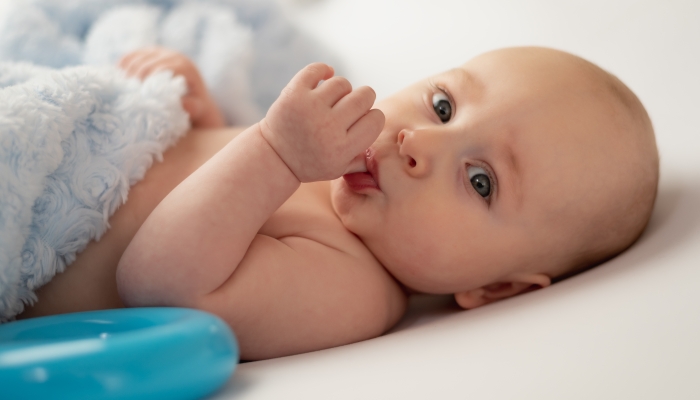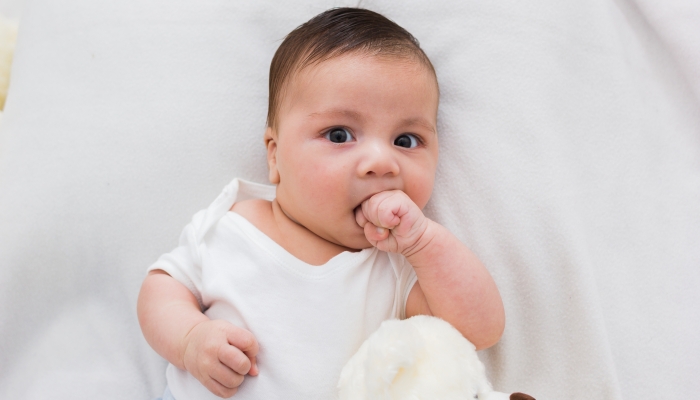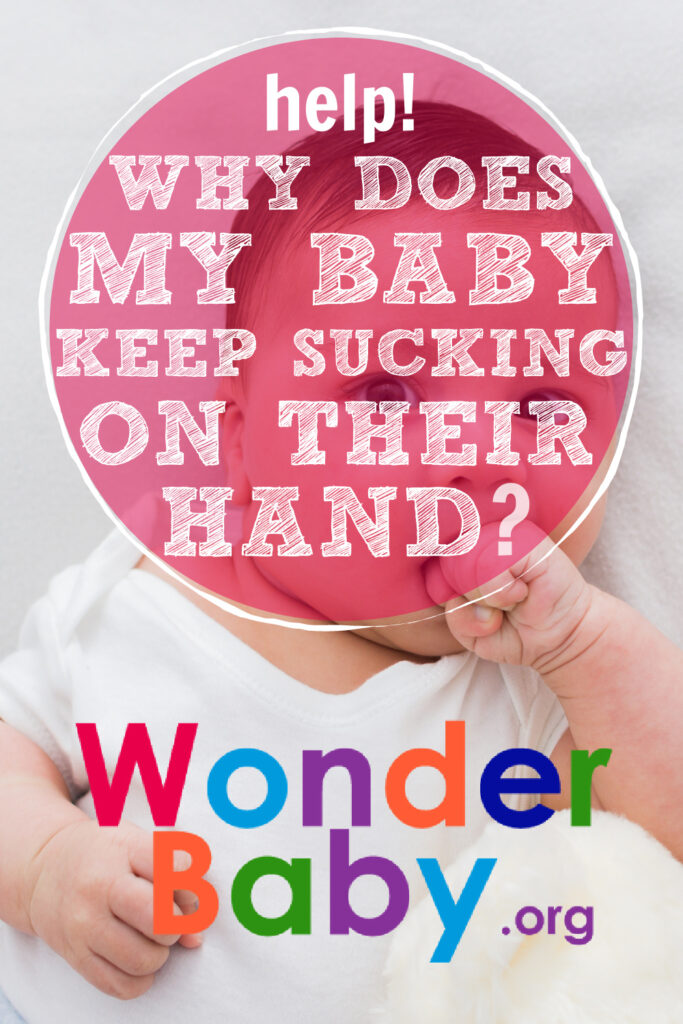Help! Why Does My Baby Keep Sucking on Their Hand?

- Most babies suck on their hands to soothe themselves.
- Your baby might suck on their hand when they’re tired or hungry.
- Thumb sucking can lead to dental problems later in life.
- Sucking hands may increase with teething pain due to sore gums.
- Give your baby a frozen feeder or pacifier to replace chewing on their hands.
It’s well known that sucking on a pacifier soothes infants and small children. There comes a time for every child when their pacifier gets taken away, and they stop the habit of sucking. This can be a more problematic habit to break if they use their hand or fingers for comfort since those will always be with them.
Parents often worry about their child’s thumb or hand-sucking habits. You might wonder, why does my baby keep sucking on their hand? You can rest assured that this is completely normal for babies to do.
Baby Sucking on Their Hand: Is This Normal?
It is perfectly normal for your baby to suck on their hand. Newborns have a natural sucking instinct or sucking reflex that helps them with eating and self-soothing. In fact, Raghavendra M Shetty of the Department of Dentistry states that hand-sucking is the most common habit in children.
Why Do Some Babies Keep Sucking on Their Hands?
While it is extremely common, not all babies suck on their hands. Just like eye color and height, all babies are a little bit different.
Self Soothing
Some children use hand sucking as a way to soothe themselves. You may notice that your child chews on their hands more often at night or when they are tired. Most babies are soothed by sucking, which is why pacifiers are so effective at helping your newborn baby or infant calm down when they are upset.
Hunger Cues
The United States Department of Agriculture states that one of a baby’s most obvious hunger cues is sucking on their hands. It can be difficult to tell whether your baby has gotten enough breast milk, especially for parents who exclusively breastfeed. Infants and young babies have no way to tell you they are hungry, so it is important to watch for other hunger cues like restlessness or lip smacking.
Teething
In older babies, teething is the most common cause of chewing on hands. Right before a tooth erupts, it puts pressure on the gums, which can be painful for your child.
Chewing on their hands can change the pressure and ease the gum pain. If you notice that your baby seems to put their fingers and other things in their mouth constantly, you can safely assume teething is the cause.

Does Hand Sucking Cause Oral Problems in Babies?
According to Patrick C. Friman, PhD and Barton D. Schmitt, MD in the article Thumb Sucking: Pediatricians’ Guidelines, thumb sucking does not usually cause problems unless it persists past the age of four. While it is good to try to break the habit before it becomes a problem, try not to worry if your infant or young toddler is always sucking on their hands.
Thumb Sucking and Teeth
If your child continues to suck their thumb past four years old, they may start to have dental problems that will need orthodontic correction. If your toddler is constantly sucking on her hands, talk to your pediatrician about ways you can help them stop.
Hand Sucking and Illness
The biggest problem with hand-sucking is that it is a common cause of spreading sickness. When your baby touches items and then sucks on their hand, they are at higher risk of catching an illness. The reverse is also true; viruses and bacteria spread to others when your baby sucks their hand and touches other items.
Try to keep your baby’s hands clean, and use a sanitizing wipe on their toys before and after they play with them, especially if you are in a public place.
Tips on How to Deal With Your Baby’s Hand Sucking
While hand-sucking is expected, you probably don’t want it to become a habit. If your baby is constantly sucking on their hands, there are a few things you can do to help them do it less or even stop altogether.
Teething Toys
Teething is painful for infants, and chewing or sucking can help decrease their pain. If you notice your baby chewing on items, you can give them a cold washcloth or other cool sensory toys to chew on instead.
Having a cold teething toy to put in their mouth may keep your baby from putting their fingers or other objects into their mouth. During this time, keeping dangerous objects or choking hazards out of your baby’s reach is essential since they are probably putting almost everything in their mouths.
Pay Attention to Your Baby’s Hunger Cues
Your baby may begin sucking on her hands when she starts to get hungry. All newborns have a sucking reflex that helps them drink a bottle or breastfeed. According to Stanford Medicine, this sucking reflex develops around 36 weeks in-utero for all healthy babies.
If your baby continues putting their hands in their mouth after feeding, they may not have gotten enough milk. Other signs that your baby is still hungry include restlessness, turning their head from side to side, or smacking their lips. Crying is a late sign of hunger.

Help Your Baby with Self Soothing
Many babies suck on their hands to self-soothe as they fall asleep. In fact, babies who suck their thumbs tend to be better sleepers than those who depend on a bottle or pacifier to sleep. This is because their hand is always available, unlike a pacifier that could get lost in bed or fall out of your baby’s reach.
When Do Babies Outgrow Hand Sucking?
Most babies and children stop hand sucking on their own around the age of two or three.
FAQs
What is the best way to keep your baby’s hands clean?
Keeping a pack of wet wipes in your diaper bag is the most practical way to keep your baby’s hands clean. If you have a child who is constantly sucking on their hands, try using hand wipes frequently when in public. While washing with soap and water is the best way to clean hands, it is only sometimes the most practical.
Should I give my baby a pacifier instead of letting them suck on their hands?
If your baby is getting older and you are worried about a thumb-sucking habit, consider offering a pacifier instead since that habit can be easier to break. However, babies who suck on their hands are able to self-soothe, allowing them to sleep independently at night. Thumb-sucking in infants rarely leads to long-term problems.
Does bottle feeding increase babies chewing on their hands?
Bottle-fed and breastfed babies have the same sucking reflex, and both use sucking as a way to self-soothe. Whether your baby uses a bottle or is breastfed should not affect how much they suck on their hands.

The information WonderBaby provides is not intended to be, and does not constitute, medical or other health advice or diagnosis and should not be used as such. Always consult with a qualified medical professional about your specific circumstances.
Related Posts

Development, Special Needs
How to Track Milestones for Developmentally Delayed Babies
Parents of developmentally delayed babies can explore practical tools and strategies to track milestones, celebrate progress, and support their child’s unique developmental journey.

Fine and Gross Motor
5 Alternatives to Tummy Time for Babies with Motor Development Challenges
Does your baby struggle with tummy time due to motor development challenges? These alternatives to tummy time will offer the same benefits.

Development
Should Twins Share a Room?
Wondering if your twins should share a room? We’ll explore the pros and cons of room-sharing for twins right here before you make your decision.